Christine Drake criticizes media distortion amid Gaza attacks, underscores UK's role in conflict to Anadolu
Mucahit Aydemir |15.10.2023 -

76-year-old British woman Christine Drake speaks during an exclusive interview with Anadolu, as she volunteers for Palestinians in Jerusalem, on October 13, 2023
. ( Hisham K. K. Abu Shaqra - Anadolu Agency )
RAMALLAH, Palestine
British native Christine Drake, who serves as a humanitarian aid volunteer in the occupied Palestinian territories, said the Palestinian-Israeli conflict stems from an "illegal occupation," but international media distorts it by adopting Israel's narrative.
The Israeli army's bloody attacks on besieged Gaza continued for an eighth day.
Palestinians in the occupied West Bank cities have been taking to the streets in support of Gaza for days, despite Israeli forces' barriers, roadblocks and interventions with live ammunition.
In Ramallah, like in other West Bank cities, Israeli forces are stationed at the entrance, and thousands of Palestinians are trying to resist by burning tires and throwing stones.
Due to this cycle of violence, an elderly British woman standing in solidarity with Palestinians despite all the dangers and her advanced age, is drawing attention.
The situation in Palestine is an illegal occupation
Drake said she has been supporting Palestine for 45 years and has been volunteering here for eight years.
Drake told Anadolu that the "Gaza-Israel war" began while she was volunteering in Ramallah.
She said she participated in solidarity demonstrations with Gaza in Ramallah to show support for Palestinians due to the closeness she felt.
“They have no rights, no justice, no civil liberties, no free speech. They have no anything. It's a cruel and dangerous place and every day their lives are altered by decisions made by an illegal occupier,” she said.
International media is a puppet of the Israeli government
Drake criticized the role of international media in Israel's attacks on Gaza.
“The international media is a puppet of the Israeli government. International media will say whatever they want them to say. It has no relevance in this world because it's not the truth,” said Drake. “The truth is that this is called Palestine and this is where Palestinians lived.”
She cited the UK's role as the source of the problem in Palestine.
“The country that I came from (the UK) gave away the land of this country to people who have no right to it. And ever since then, they have been stealing more and more of that land. So. there's hardly any land left. It's not acceptable.
“Governments of the world that support Israeli government are nothing but liars, murderers and thieves … and nobody is doing anything to stop them,” she said.
“And I feel really angry on behalf of the Palestinians because in the time that I've come here, they have shown me nothing but kindness, and take care of me and looked after me, and that’s who the Palestinians are. They don’t deserve any of this garbage,” said Drake.
The UK set the wheels in motion for the current situation
“I come from the country that began this. When they gave away land to Israel, they set the wheels in motion for this to happen,” said Drake.
“Because Israel is never going to be honest. They will always lie, they will always cheat and steal. They've been doing it for 75 years and the Palestinians have been suffering and it's not okay.” she said.
The British woman, who expressed her love for the Palestinians and her wish for the best for them, said: "I don't know why the world is turning away. I can't fathom it."
RAMALLAH, Palestine
British native Christine Drake, who serves as a humanitarian aid volunteer in the occupied Palestinian territories, said the Palestinian-Israeli conflict stems from an "illegal occupation," but international media distorts it by adopting Israel's narrative.
The Israeli army's bloody attacks on besieged Gaza continued for an eighth day.
Palestinians in the occupied West Bank cities have been taking to the streets in support of Gaza for days, despite Israeli forces' barriers, roadblocks and interventions with live ammunition.
In Ramallah, like in other West Bank cities, Israeli forces are stationed at the entrance, and thousands of Palestinians are trying to resist by burning tires and throwing stones.
Due to this cycle of violence, an elderly British woman standing in solidarity with Palestinians despite all the dangers and her advanced age, is drawing attention.
The situation in Palestine is an illegal occupation
Drake said she has been supporting Palestine for 45 years and has been volunteering here for eight years.
Drake told Anadolu that the "Gaza-Israel war" began while she was volunteering in Ramallah.
She said she participated in solidarity demonstrations with Gaza in Ramallah to show support for Palestinians due to the closeness she felt.
“They have no rights, no justice, no civil liberties, no free speech. They have no anything. It's a cruel and dangerous place and every day their lives are altered by decisions made by an illegal occupier,” she said.
International media is a puppet of the Israeli government
Drake criticized the role of international media in Israel's attacks on Gaza.
“The international media is a puppet of the Israeli government. International media will say whatever they want them to say. It has no relevance in this world because it's not the truth,” said Drake. “The truth is that this is called Palestine and this is where Palestinians lived.”
She cited the UK's role as the source of the problem in Palestine.
“The country that I came from (the UK) gave away the land of this country to people who have no right to it. And ever since then, they have been stealing more and more of that land. So. there's hardly any land left. It's not acceptable.
“Governments of the world that support Israeli government are nothing but liars, murderers and thieves … and nobody is doing anything to stop them,” she said.
“And I feel really angry on behalf of the Palestinians because in the time that I've come here, they have shown me nothing but kindness, and take care of me and looked after me, and that’s who the Palestinians are. They don’t deserve any of this garbage,” said Drake.
The UK set the wheels in motion for the current situation
“I come from the country that began this. When they gave away land to Israel, they set the wheels in motion for this to happen,” said Drake.
“Because Israel is never going to be honest. They will always lie, they will always cheat and steal. They've been doing it for 75 years and the Palestinians have been suffering and it's not okay.” she said.
The British woman, who expressed her love for the Palestinians and her wish for the best for them, said: "I don't know why the world is turning away. I can't fathom it."
Palestinian Americans watch with dread as family members in Gaza struggle to stay alive
For Palestinian Americans, there’s a sense of helplessness and hopelessness as many struggle to hear from their families in Gaza. Those in the U.S. are left watching from afar as their families struggle to find safety.
BY NOREEN NASIR
October 14, 2023
NEW YORK (AP) — For the unforeseeable future, Laila El-Haddad has one mission: to get the voices of her fellow Palestinians, along with their pleas for help, out to the rest of the world.
From her home office in Columbia, Maryland, El-Haddad frantically juggled phone calls this week from journalists seeking her expertise on Gaza and Palestinian Americans trying to get the attention of their local elected officials.
In between the calls, the 45-year-old mother and author checked WhatsApp, the global messaging application, for updates from her own family members in Gaza during their brief windows of electricity and internet access. Electricity was since cut off by Israel and internet outages have made it difficult for many to keep in touch.
“I’m just trying to stay sane by doing what I can to help,” El-Haddad said.
OTHER NEWS
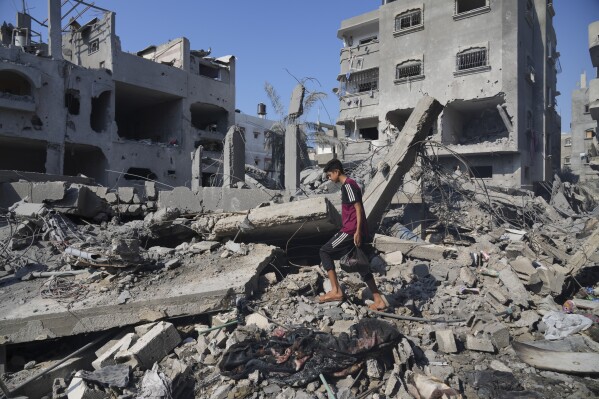
Packed Gaza hospitals warn that thousands could die as supplies run low and ground offensive looms
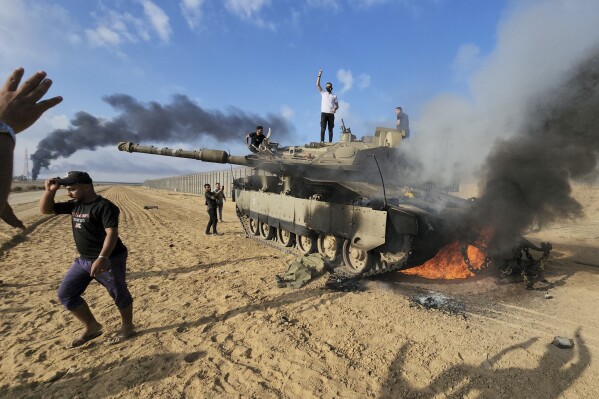
A week of war brings grief to everyday Israelis and Palestinians alike
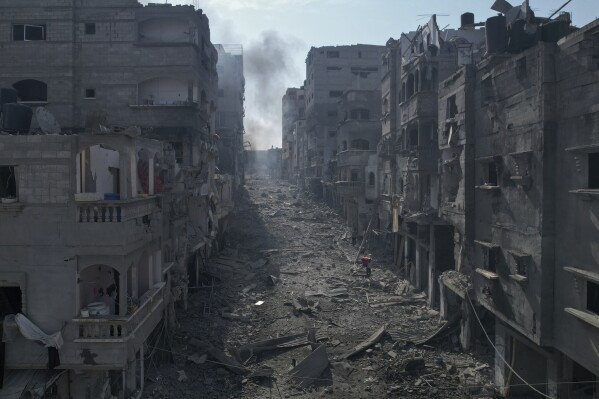
Lack of water worsens misery in besieged Gaza as Israeli airstrikes continue
For many Palestinian Americans, there’s a sense of helplessness and hopelessness as they struggle to hear from loved ones in Gaza. Amid a fuel and water shortage, no electricity, and now a forced evacuation in the north, administering and sending aid to civilians in Gaza is near impossible
Israel has bombarded Gaza with airstrikes for days and has threatened a ground invasion in response to Hamas’ attack on Israel that killed 1,300 last weekend. The Gaza Health Ministry said Saturday that over 2,200 people have been killed in the besieged territory in the last several days, including 724 children and 458 women. With a looming humanitarian crisis, that number is expected to rise.
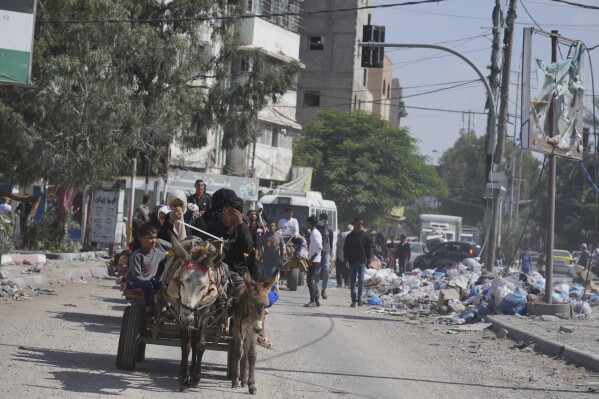
Palestinians flee to the southern Gaza Strip after the Israeli army issued an evacuation warning to a population of over 1 million in northern Gaza and Gaza City to seek refuge in the south ahead of a possible Israeli ground invasion, Friday, Oct. 13, 2023.
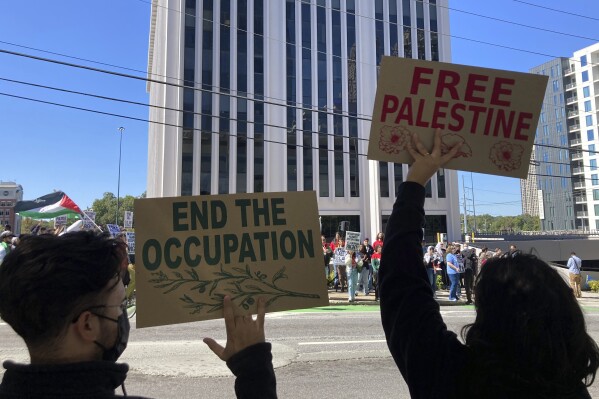
Pro-Palestinian demonstrators chant slogans outside the Israeli consulate in Atlanta on Sunday, Oct. 8, 2023. For Palestinian Americans, there’s a sense of helplessness and hopelessness as many struggle to hear from their families in Gaza. Amid a fuel and water shortage, no electricity, and now a forced evacuation in the north, administering and sending aid to civilians in Gaza is near impossible.
For Palestinian Americans, there’s a sense of helplessness and hopelessness as many struggle to hear from their families in Gaza. Those in the U.S. are left watching from afar as their families struggle to find safety.
BY NOREEN NASIR
October 14, 2023
NEW YORK (AP) — For the unforeseeable future, Laila El-Haddad has one mission: to get the voices of her fellow Palestinians, along with their pleas for help, out to the rest of the world.
From her home office in Columbia, Maryland, El-Haddad frantically juggled phone calls this week from journalists seeking her expertise on Gaza and Palestinian Americans trying to get the attention of their local elected officials.
In between the calls, the 45-year-old mother and author checked WhatsApp, the global messaging application, for updates from her own family members in Gaza during their brief windows of electricity and internet access. Electricity was since cut off by Israel and internet outages have made it difficult for many to keep in touch.
“I’m just trying to stay sane by doing what I can to help,” El-Haddad said.
OTHER NEWS
Packed Gaza hospitals warn that thousands could die as supplies run low and ground offensive looms
A week of war brings grief to everyday Israelis and Palestinians alike
Lack of water worsens misery in besieged Gaza as Israeli airstrikes continue
For many Palestinian Americans, there’s a sense of helplessness and hopelessness as they struggle to hear from loved ones in Gaza. Amid a fuel and water shortage, no electricity, and now a forced evacuation in the north, administering and sending aid to civilians in Gaza is near impossible
Israel has bombarded Gaza with airstrikes for days and has threatened a ground invasion in response to Hamas’ attack on Israel that killed 1,300 last weekend. The Gaza Health Ministry said Saturday that over 2,200 people have been killed in the besieged territory in the last several days, including 724 children and 458 women. With a looming humanitarian crisis, that number is expected to rise.
Palestinians flee to the southern Gaza Strip after the Israeli army issued an evacuation warning to a population of over 1 million in northern Gaza and Gaza City to seek refuge in the south ahead of a possible Israeli ground invasion, Friday, Oct. 13, 2023.
(AP Photo/Hatem Moussa)
But even before this week, getting to Gaza to visit family for Palestinian Americans was a lengthy, exhausting and difficult experience, and most people who live Gaza can never leave. Unlike Israeli Americans, Palestinian Americans say they have never been afforded the opportunity to freely help their loved ones in times of crisis.
Mohammad AbuLughod, who lives in a suburb of Milwaukee, received fragmented updates from a cell phone his family in Gaza kept charged via a solar panel. His family shared those messages with The Associated Press:
An elder in the family died from an airstrike. They tried to seek shelter in a United Nations school, before deciding to stay home. Schools were damaged by airstrikes. Children died. Buildings have been reduced to rubble. They don’t know if the neighbors are alive. They are all gathered now, three generations, in one house. When the bombs come, they will die together. No one will have to live alone.
“I feel I am living in a nightmare,” one relative wrote in a message to the family.
AbuLughod is at a loss for what to do. “There’s no way to send support, we can’t send them money and money would probably be useless, because there’s nothing to buy,” he said.
Deanna Othman’s young nephew in Gaza messaged her on Instagram to say it may be the last time he’s able to talk to her
“How do you reply to that?” Othman, who lives in a suburb of Chicago, said in an interview with the AP. “How can you say anything to comfort someone who is facing their own mortality?”
Haneen Okal, a Palestinian American living in New Jersey, is currently stuck in Gaza with her three young children. She’d gone to Gaza while pregnant, after 9 years away to visit her family, and planned to travel back to New Jersey to deliver her baby. But after experiencing a medical emergency, she delivered her baby in Gaza in August, and has remained there since.
Minutes before she was set to leave Gaza through the Rafah crossing with Egypt earlier this week, Israeli airstrikes left the crossing inoperable. She and her children traveled back to the Rafah crossing on Saturday in the hopes that the U.S. government would allow for their safe evacuation. So far, she said, State Department officials have not told her if they will help her leave. Abdulla, Okal’s husband, is pleading with the U.S. government from New Jersey to bring his family home.
“There’s no place safe here in the Gaza Strip,” Haneen Okal said in a recorded video sent to the AP via WhatsApp. “My kids are feeling so scared. ... Please help us get evacuated safely.”
Many Palestinian Americans watched in agony this week as Israelis abroad rushed to travel to Israel following the Hamas assault, signing up to fight in military reserve units or administer aid on the ground. Palestinian Americans say they’ve never had the option to do the same.
With the Gaza Strip, a sliver of land only 25 miles (40 kilometers) long with 2.3 million people, essentially dark and the Israeli blockade making delivering humanitarian aid even more challenging, those who have family in Gaza are left watching from afar, feeling powerless as their families struggle to find safety.
“It’s just too traumatic for me right now to see American citizens who, even predating this, have the privilege and the access to my country that my husband, a Palestinian whose own parents and grandparents were forced to flee from their homes, doesn’t enjoy,” said El-Haddad, the author in Maryland.
Othman and her family traveled from the suburbs of Chicago to Gaza this summer — a process she described as mentally, physically and bureaucratically difficult. Othman’s extended family lives in the Israeli-occupied Palestinian territory of the West Bank, but her husband’s family is in Gaza. If she wanted to visit her family in the West Bank, she’d have to go without her husband, who, like most people with a Gaza ID, cannot travel to the West Bank under the Israeli occupation.
“My family in the West Bank was only about 40 miles (64 km) away from me when I was in Gaza,” Othman said. “But the amount of effort it would have taken to get to them just wouldn’t have worked.”
Several years ago, during more peaceful times, Nahed Elrayes and his father tried for days to enter Gaza from Tel Aviv to catch his terminally ill grandmother’s final moments.
“The Israelis simply would not let us enter Gaza,” he said. On the third day of trying, Elrayes’ grandmother passed away and the Israeli forces finally allowed them entry to attend the funeral services.
“I will never forget being with my father that day,” Elrayes said. “There is no respect for our humanity.”
But even before this week, getting to Gaza to visit family for Palestinian Americans was a lengthy, exhausting and difficult experience, and most people who live Gaza can never leave. Unlike Israeli Americans, Palestinian Americans say they have never been afforded the opportunity to freely help their loved ones in times of crisis.
Mohammad AbuLughod, who lives in a suburb of Milwaukee, received fragmented updates from a cell phone his family in Gaza kept charged via a solar panel. His family shared those messages with The Associated Press:
An elder in the family died from an airstrike. They tried to seek shelter in a United Nations school, before deciding to stay home. Schools were damaged by airstrikes. Children died. Buildings have been reduced to rubble. They don’t know if the neighbors are alive. They are all gathered now, three generations, in one house. When the bombs come, they will die together. No one will have to live alone.
“I feel I am living in a nightmare,” one relative wrote in a message to the family.
AbuLughod is at a loss for what to do. “There’s no way to send support, we can’t send them money and money would probably be useless, because there’s nothing to buy,” he said.
Deanna Othman’s young nephew in Gaza messaged her on Instagram to say it may be the last time he’s able to talk to her
“How do you reply to that?” Othman, who lives in a suburb of Chicago, said in an interview with the AP. “How can you say anything to comfort someone who is facing their own mortality?”
Haneen Okal, a Palestinian American living in New Jersey, is currently stuck in Gaza with her three young children. She’d gone to Gaza while pregnant, after 9 years away to visit her family, and planned to travel back to New Jersey to deliver her baby. But after experiencing a medical emergency, she delivered her baby in Gaza in August, and has remained there since.
Minutes before she was set to leave Gaza through the Rafah crossing with Egypt earlier this week, Israeli airstrikes left the crossing inoperable. She and her children traveled back to the Rafah crossing on Saturday in the hopes that the U.S. government would allow for their safe evacuation. So far, she said, State Department officials have not told her if they will help her leave. Abdulla, Okal’s husband, is pleading with the U.S. government from New Jersey to bring his family home.
“There’s no place safe here in the Gaza Strip,” Haneen Okal said in a recorded video sent to the AP via WhatsApp. “My kids are feeling so scared. ... Please help us get evacuated safely.”
Many Palestinian Americans watched in agony this week as Israelis abroad rushed to travel to Israel following the Hamas assault, signing up to fight in military reserve units or administer aid on the ground. Palestinian Americans say they’ve never had the option to do the same.
With the Gaza Strip, a sliver of land only 25 miles (40 kilometers) long with 2.3 million people, essentially dark and the Israeli blockade making delivering humanitarian aid even more challenging, those who have family in Gaza are left watching from afar, feeling powerless as their families struggle to find safety.
“It’s just too traumatic for me right now to see American citizens who, even predating this, have the privilege and the access to my country that my husband, a Palestinian whose own parents and grandparents were forced to flee from their homes, doesn’t enjoy,” said El-Haddad, the author in Maryland.
Othman and her family traveled from the suburbs of Chicago to Gaza this summer — a process she described as mentally, physically and bureaucratically difficult. Othman’s extended family lives in the Israeli-occupied Palestinian territory of the West Bank, but her husband’s family is in Gaza. If she wanted to visit her family in the West Bank, she’d have to go without her husband, who, like most people with a Gaza ID, cannot travel to the West Bank under the Israeli occupation.
“My family in the West Bank was only about 40 miles (64 km) away from me when I was in Gaza,” Othman said. “But the amount of effort it would have taken to get to them just wouldn’t have worked.”
Several years ago, during more peaceful times, Nahed Elrayes and his father tried for days to enter Gaza from Tel Aviv to catch his terminally ill grandmother’s final moments.
“The Israelis simply would not let us enter Gaza,” he said. On the third day of trying, Elrayes’ grandmother passed away and the Israeli forces finally allowed them entry to attend the funeral services.
“I will never forget being with my father that day,” Elrayes said. “There is no respect for our humanity.”
Pro-Palestinian demonstrators chant slogans outside the Israeli consulate in Atlanta on Sunday, Oct. 8, 2023. For Palestinian Americans, there’s a sense of helplessness and hopelessness as many struggle to hear from their families in Gaza. Amid a fuel and water shortage, no electricity, and now a forced evacuation in the north, administering and sending aid to civilians in Gaza is near impossible.
(AP Photo/Jeff Amy, File)
The story of so many Palestinian Americans is one of longing, loss and a sense that their history is being erased. Many Palestinian families are shaped by the history of becoming refugees relatively recently. Gaza is, in part, so densely populated today because of the mass exodus of Palestinians from what is now Israel during the 1948 war surrounding its creation.
It’s the echoes of the 1948 Nakba, or “catastrophe” that haunt AbuLughod and his family — refugees originally from the Palestinian town Yaffa, now Jaffa, Israel — as they watch the scenes of mass evacuation playing out from Gaza this week. The fear is that Palestinians in Gaza, like those who were forced to leave their homes in 1948, will never be able to return. For so many Palestinians who have experienced the loss of their land and homes, identity is all they have left.
“What’s heaviest at the moment is that the world is going to watch a group of people be killed mercilessly and pushed out, in real time, and believe it to be right and OK and just,” said Amirah AbuLughod, Mohammad’s daughter.
To cope with the dire outlook, Hani Almadhoun said he and his fellow Palestinian American colleagues at UNRWA USA are pouring themselves into their work supporting the U.N. agency for Palestinian refugees, trying to provide aid to people on the ground in Gaza despite the challenges. Eleven UNRWA staff members were killed in airstrikes in Gaza this week.
“There are no heroes right now in Gaza. Everybody’s damaged. Everybody’s burying somebody,” Almadhoun said. “And I hope I am wrong, but this is going to go on for a long time. A lot more people will lose their lives and then nobody’s going to be held accountable.”
____
Noreen Nasir is a New York-based member of the AP’s Race and Ethnicity team. Follow her on social media: twitter.com/noreensnasir.
The story of so many Palestinian Americans is one of longing, loss and a sense that their history is being erased. Many Palestinian families are shaped by the history of becoming refugees relatively recently. Gaza is, in part, so densely populated today because of the mass exodus of Palestinians from what is now Israel during the 1948 war surrounding its creation.
It’s the echoes of the 1948 Nakba, or “catastrophe” that haunt AbuLughod and his family — refugees originally from the Palestinian town Yaffa, now Jaffa, Israel — as they watch the scenes of mass evacuation playing out from Gaza this week. The fear is that Palestinians in Gaza, like those who were forced to leave their homes in 1948, will never be able to return. For so many Palestinians who have experienced the loss of their land and homes, identity is all they have left.
“What’s heaviest at the moment is that the world is going to watch a group of people be killed mercilessly and pushed out, in real time, and believe it to be right and OK and just,” said Amirah AbuLughod, Mohammad’s daughter.
To cope with the dire outlook, Hani Almadhoun said he and his fellow Palestinian American colleagues at UNRWA USA are pouring themselves into their work supporting the U.N. agency for Palestinian refugees, trying to provide aid to people on the ground in Gaza despite the challenges. Eleven UNRWA staff members were killed in airstrikes in Gaza this week.
“There are no heroes right now in Gaza. Everybody’s damaged. Everybody’s burying somebody,” Almadhoun said. “And I hope I am wrong, but this is going to go on for a long time. A lot more people will lose their lives and then nobody’s going to be held accountable.”
____
Noreen Nasir is a New York-based member of the AP’s Race and Ethnicity team. Follow her on social media: twitter.com/noreensnasir.
No comments:
Post a Comment